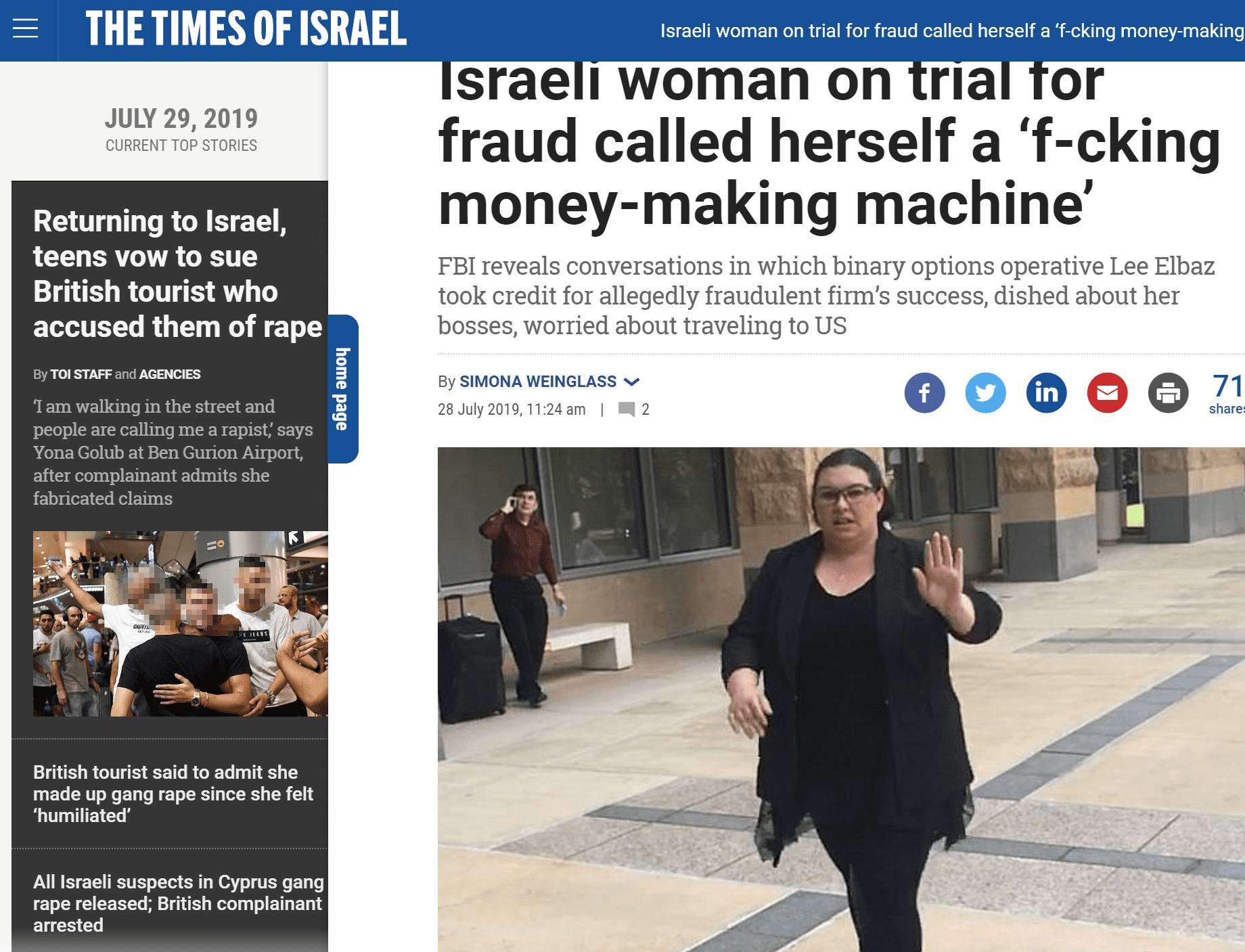Lee Elbaz stood trial on Tuesday to tell the jury that she may have lied to clients about her name and her experience in financial markets, but she never misled investors about the financial product. The 38-
Little lies are allowed, the lawyer sayd
On the ninth day of her trial, the Elbaz testified that she believed it was actually legal
- to use a fake name,
- exaggerate her limited experience in financial markets, and
- tell clients she was working from a London trading floor rather than in a boiler room in Israel.
She referred to legal advice she allegedly received. Elbaz’s counsel, Barry J. Pollack presented the mentioned legal opinion to the jury. In this, an attorney says that such deception runs into trouble with Israeli law only when it involves “essential information only regarding the asset or the service.”
Pollack asked Elbaz if she thought there was anything improper in Yukom sales agents telling investors they were married and had children, even if none of it was true.
“No,” Elbaz said. “It’s not related to the product. I did not see anything wrong in that.”
Prosecutors claim that Elbaz reeled in clients with lies and instructed her subordinates to do the same. Furthermore, the purport that Elbaz also worked behind the scenes to drain client accounts that had too much liquid, or withdrawable cash.
The clients are the scammers
Elbaz said the measures she took on the back end — manipulating client accounts by upping the risk settings — were to combat clients’ abuse of the binary options trading system and not to ensure clients couldn’t take home their winnings. So it was the fraudulent customers who were to blame for the manipulation of the accounts. A classic reversal of the perpetrator-victim role.
Pollack instructed the courtroom to take another look at the host of emails prosecutors had shown before resting their case Friday, in which Elbaz urges her contact at the binary options trading platform to switch Yukom clients to “high-risk” trades when they pulled in big wins.
“The customer
Lee Elbaz instractions to a Yukom employeehave [sic] a profit of $50,000 from $6,000 deposit! Friends, how did this happen? Please put on high-risk,”
Elbaz said she moved a client to high-risk when she suspected the client was cheating the system Nonstop winning trades usually indicated the client was taking advantage of the process.
Financial Vampirism – net deposits were the profit
According to prosecutors, however, Yukom clients’ trading success was irrelevant, if not undesired at the company. Yukom and its employees’ profits primarely stemmed from the client net deposits (deposits less any withdrawals). And bleeding clients’ accounts with risky trades stymied any potential withdrawals, according to prosecutors, so Elbaz did it often.
To “drink clients” was the slang for this behavior explained the former Yukom employee Liora Welles in her testimony last week.
I didn’t know the magnitude of this thing. If I could take it all back I would. It took me a long time to realize what I did. I’m taking responsibility, I’m here.
Liora Welles in her testimony
Welles pleaded guilty to binary options fraud in December 2018 in a plea deal. She agreed to cooperate with US prosecutors and to testify at the trial on the U.S. Government’s behalf.
According to the prosecutors and former Yukom employees, the financial vampirism was actually the purpose of the Yukom Boiler Rooms behind the binary options. The Yukom boiler rooms have sold BinaryBook and BigOption CyberScams among others.
Innocent in the meaning of the indictment
The line of defense of Lee Elbaz evidently is that she did not induce her subordinates to cheat clients. She admits to having lied on a small scale but on the whole, she purported to have acted openly and honestly. The scammers might have been their employees, but she wasn’t. The testimonies of their former employees against her would only have happened because they wanted to reduce their own punishments.
You committed a lot of fraud at Yukom. You pled guilty. You are looking at a lot of jail time. The offense you pled guilty to carried a maximum sentence of five years. The government could have charged you with wire fraud for a sentence of 20 years. If the G
Barry J. Pollack to Liora Welles during her testimonyovernment likes what they hear, it’s up to them to decide whether or not to make a motion.
Elbaz started at Yukom in mid-2014 as a team leader and oversaw the company’s sales agents. Within a year, she had risen to CEO and allegedly directed her subordinates to “work in a straight and clean way,” according to her Tuesday’s testimony.
Pollack presented jurors another email from Elbaz in which she rebuked her subordinates for “spreading imaginary promises,” and insisted they work “straight,” which she said means “honestly,” in Israel and “clean,” which she said roughly translates to “by the book.”
Elbaz is one of several former Yukom employees whom prosecutors have charged with wire fraud, including former Yukom owner Yosef (Yossi) Herzog. According to Herzog’s indictment,
While Elbaz’ trial is about to finish on August 2, 2019, and Herzog’s case is just getting started, five former Yukom employees have already pled guilty to binary options fraud, including two former Yukom sales representatives who agreed to testify in Elbaz’s trial in exchange for more lenient sentences.
We suggest reading Simona Weinglass‘ report on the Lee Elbaz trial here in the Times of Israel. As an investigative journalist, Simona has created worldwide public awareness of the fraudulent Israeli binary options industry with her series on the Wolves of Tel Aviv (2016). She has contributed to numerous reports from other media on binary options, such as a Canadian TV channel’s report on the suicide of Canadian investor Fred Turbide after the total loss with binary options in the 23Traders scheme.
